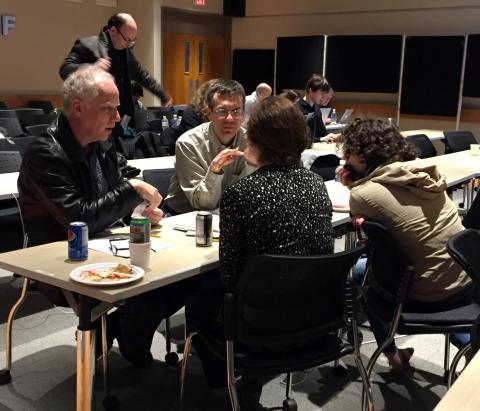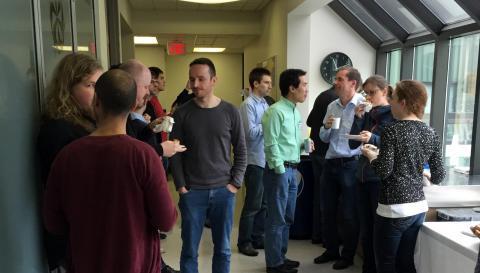

Nuclear theorists from over twenty-five research institutions recently met at TRIUMF with charts, graphs and big ideas to spark new developments in Ab Initio Nuclear Structure and Reaction Theory, a global dialogue hosted by TRIUMF and supported by the Physical Sciences Division, now in its sixth iteration.
Ab initio stems from the Latin term from the beginning and refers to the exact solution of the many-body problem within controlled approximations. Ab initio methods have been around nuclear theory for two decades, but it has only been within the last five years – with recent advancements of computing technology – that theorists are able to incorporate novel formal ideas to extend the applicability of ab initio methods to exotic nuclei and heavy mass regimes.
TRIUMF's nuclear theory department offers a broad range of expertise in nuclear structure and reaction techniques, making them ideal candidates to host workshops that provide a forum allowing for participants to exchange ideas and form collaborations to make progress. With many PhD and undergraduate students in attendance, the workshop is an opportunity for students to present their work and convene with world experts in this field.
Ab initio nuclear theory is a very broad subject, ranging from the construction of nuclear interactions to nuclear many-body and matter calculations, with an overall goal to understand nuclear phenomena and challenge experimental efforts. These versatile topics were well covered by the invited participants of the workshop.
Angelo Calci, a postdoc in the theory department and one of the organizers, remarks, “This year, the workshop revealed that nuclear structure and reaction physics have reached a new era. In the modern theory for deriving nuclear forces, chiral effective field theory (EFT), we must constrain a number of undetermined degrees of freedom. Through recent formal and technical developments, we are for the first time in a position to study the sensitivity of nuclear observables to variations of these parameters.” These sensitivity analyses have revealed that the control of the chiral uncertainties is one of the most important challenges in the future.
The next task for the community is the determination and reduction of the uncertainties resulting from the nuclear interaction and the many-body methods. The field of study is rapidly progressing, and new collaborations are forming. The Ab initio field of exotic and heavy mass regime is still in its infancy; there remain many unknowns in multiple areas of the field, unknowns these theorists are determined to discover.
- Nic Zdunich
